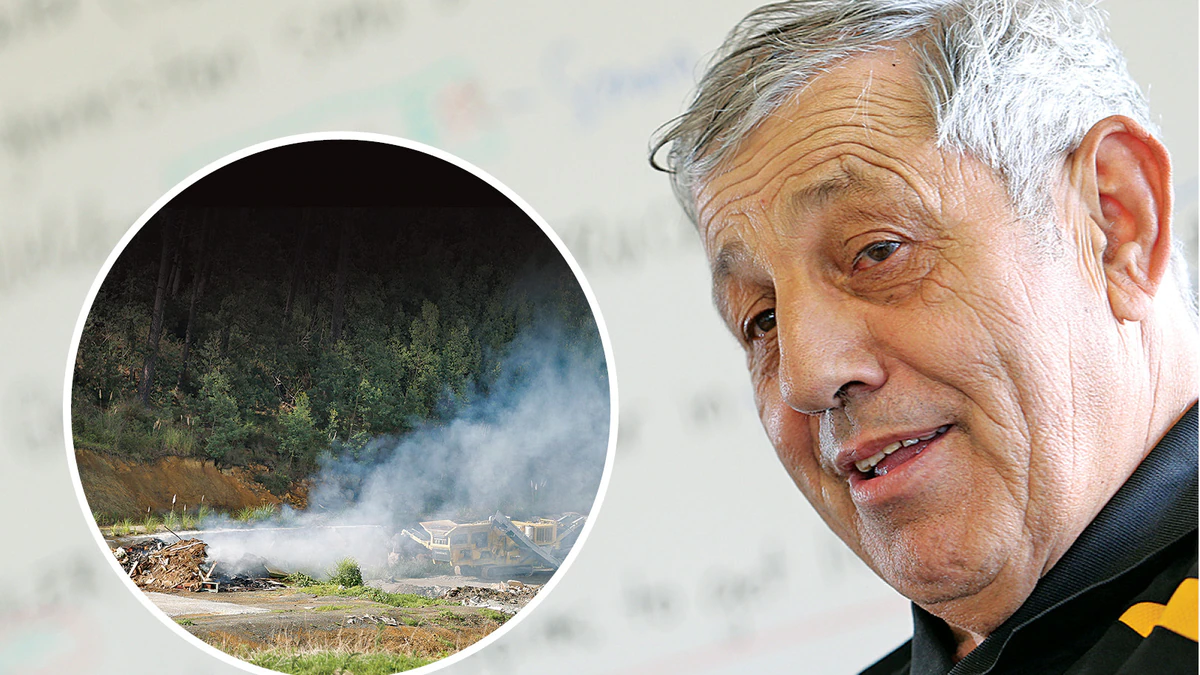Stan Semenoff was convicted for permitting a huge rubbish fire at his Whangarei business headquarters after a prosecution brought by Northland Regional Council, which he once served on. Photo / Northern Advocate
/cloudfront-ap-southeast-2.images.arcpublishing.com/nzme/GVTUITHPWVKFU7LYQQGVZ4322M.jpg)
Former Whangārei mayor Stan Semenoff has been found guilty of air pollution in relation to a rubbish fire at his business premises in 2020.
Delivering a reserved verdict in Whangārei this morning, Environment Court judge Prudence Steven convicted Semenoff of two charges under the Resource Management Act – one that he polluted the air by permitting a range of materials to burned, the other that he permitted rubber tyres to be burned.
The burning of rubber tyres is a specific offence in itself, a breach of a National Environmental standard.
The charges are each punishable by up to two years in prison or a $300,000 fine.
A sentencing date is yet to be set.
The case was brought by the Northland Regional Council – on which Semenoff previously represented ratepayers – and was heard as a one-day judge-alone trial in May.
The council alleged that while Semenoff did not personally light the fire, as managing director of the Stan Semenoff Group he permitted it and was responsible for it.
In earlier evidence about the June 3, 2020, fire Judge Steven was told Fire and Emergency NZ (FENZ) staff were about five kilometres away when they noticed black smoke billowing from the direction of the Stan Semenoff Group premises in South End Road, Raumanga.
/cloudfront-ap-southeast-2.images.arcpublishing.com/nzme/SY4YEKL6KYDKKGL3CQZJ53AB5U.jpg)
When they arrived at the site, they discovered a mound of burning rubbish measuring about 5m x 5m and piled about 2m high with various materials including plastic, metal cable, iron, PVC Piping metal, timbers such as plywood and tanalised fence posts, and rubber tyres.
A Northland Regional Council enforcement officer who also attended the scene said she spoke there with Semenoff who claimed the rubbish was fly-tipped and was being burned because he did not want to pay for it to be removed.
Semenoff told the court he was recovering from a stroke at the time and, although back at work, he had delegated most of his business responsibilities to his accountant, Carlo Lang, and a senior workshop manager, Brett Borck.
It was Borck who lit the fire, Semenoff said. Had he known about it, he would not have allowed it.
He could not recall speaking with the enforcement officer and doubted he would have made the comment she claimed.
Bork and Lang said they decided to clean up the site by burning rubbish on it.
Borck said he removed rubber he noticed on the fire pile before lighting it.
He believed the fire was permitted as Lang cleared it with the Fire Service the week beforehand.
Lang said he thought the pile was purely vegetation and had not checked it.
Prosecutor Karenza de Silva told the court Semenoff previously received abatement and infringement notices for burning rubbish at two of his sites in 2008, 2009, and 2014.
She put it to Semenoff that after those prosecutions – given he had a purported 200 employees – he should have made sure all staff were aware burning rubbish was not permitted.
Semenoff confirmed he had no formal documentation or training for staff on the subject but said staff all knew how to access regional council rules if required.
The company has businesses across logging, bulk transport, and sand mining.
/cloudfront-ap-southeast-2.images.arcpublishing.com/nzme/CU5UYZLMKC5RUXEXKBQIISNPVY.jpg)




